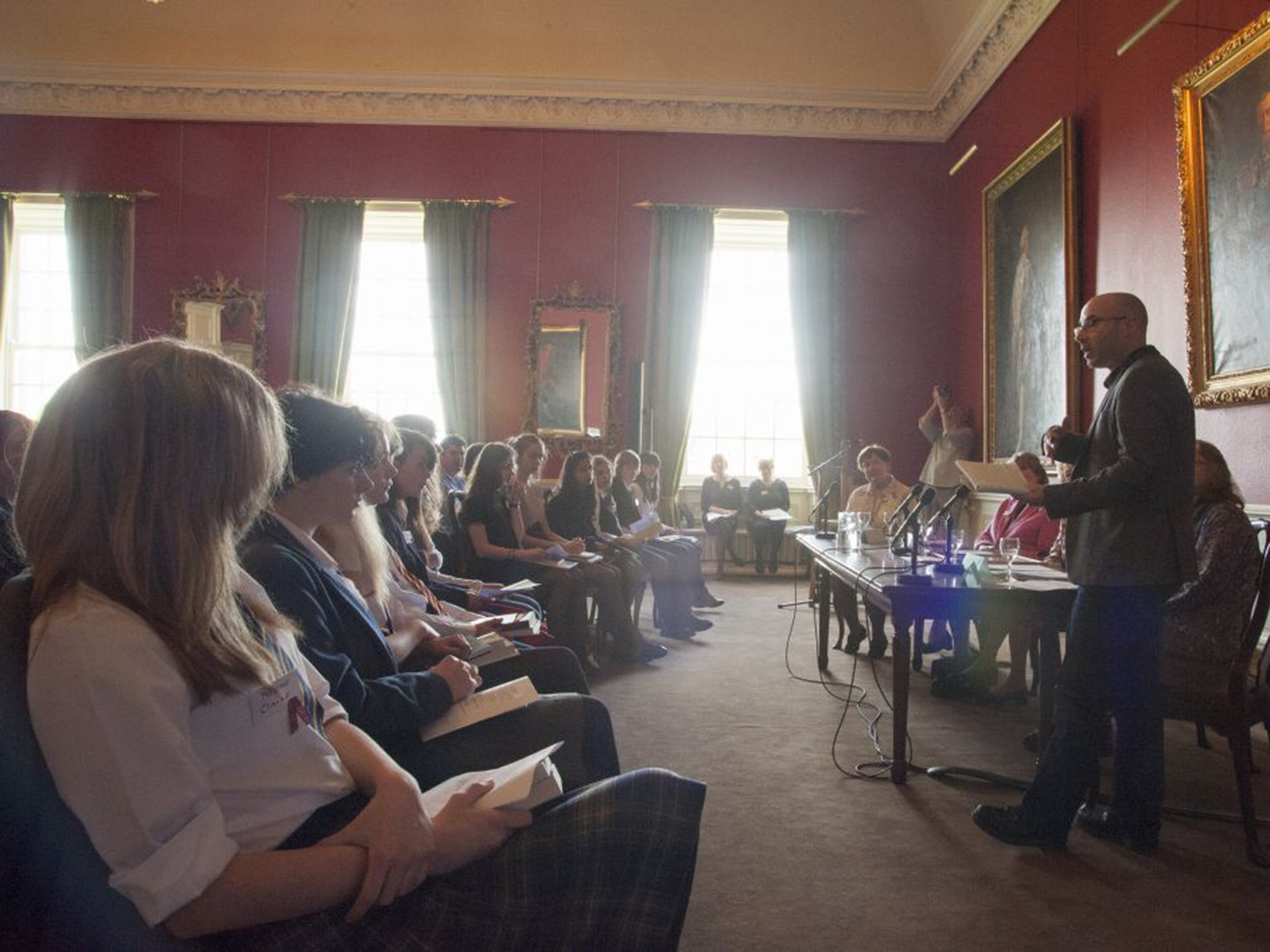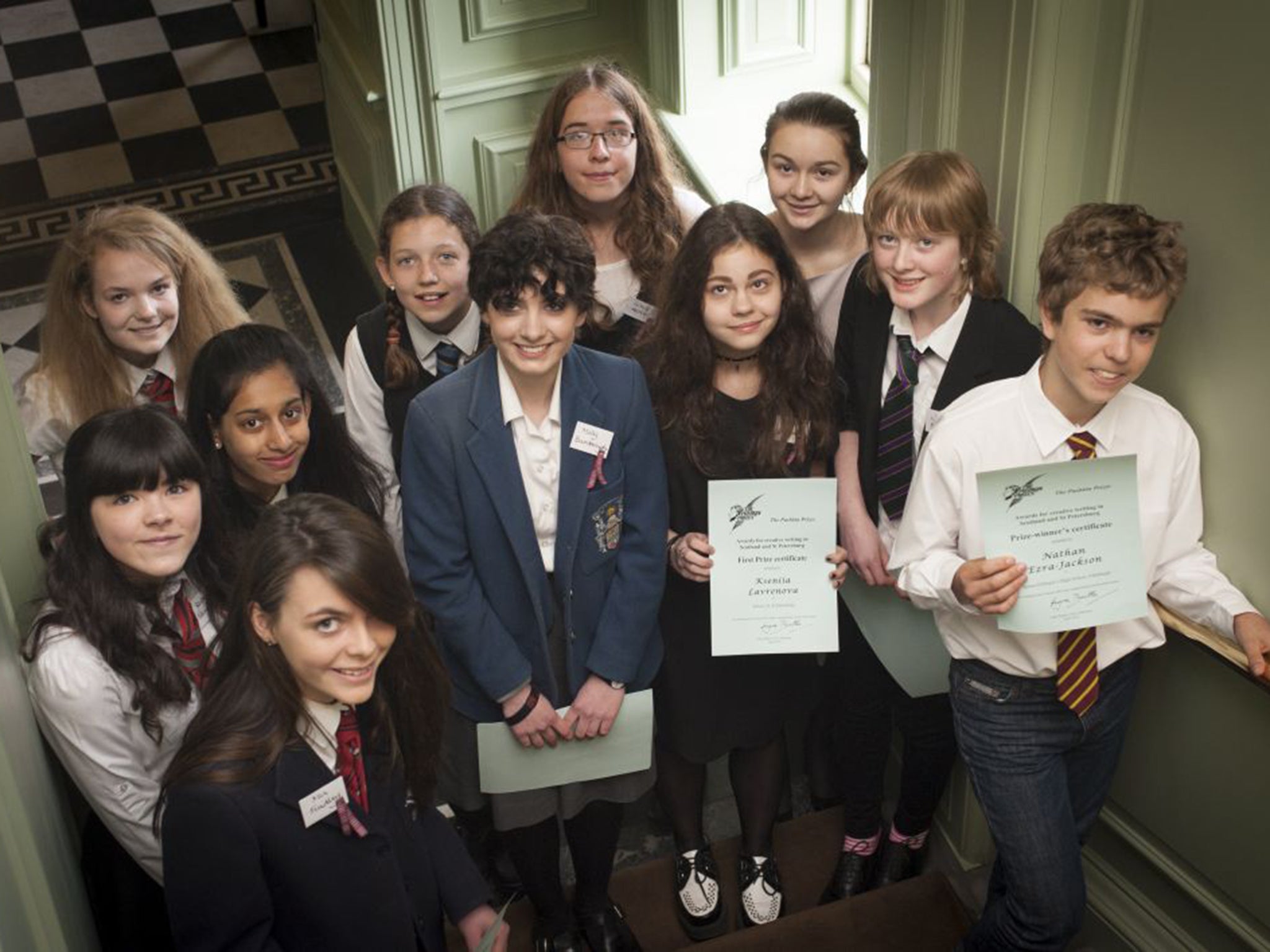Pushkin Prizes: Unusual exchange programme aims to bring countries together through culture
Ten Scottish schoolchildren and their Russian peers attended a creative writing workshop in the Highlands this week, as Chris Green reports

Two weeks before Christmas every year, a thick packet bearing a Russian postmark drops through Lindsey Fraser's letterbox. This mysterious parcel doesn't have just one story to tell, but many – and all of them written by schoolchildren in St Petersburg.
Fraser is the director of the Pushkin Prizes, a unique creative writing competition which unites the most promising young Scottish and Russian writers. It was founded in 1988 by Lady Butter, the great-great-great granddaughter of the celebrated author Alexander Pushkin, with the aim of fostering a community of writers from both countries.
The Pushkin Prizes give 10 Scottish schoolchildren, aged between 12 and 14, the chance to spend a week at Moniack Mhor, a creative writing centre near Inverness, where they are accompanied by two of their peers from St Petersburg. With no internet access or televisions, there is little to do but write – and talk.
"There's quite often some heated debate about politics while we're there," says Fraser. "I like the idea of the students understanding that we're all different but essentially the same. The Russian education system is very different from ours, so the Scottish children are stunned by that, how hard they work."
At a ceremony in Edinburgh earlier this week, shortly before they all boarded a bus heading for the Highlands, the Scottish winners selected from more than 350 entries met Kseniia Lavrenova and Dariia Pitolenko. The pair, from St Petersburg's School 20 and School 397 respectively, had not only written compelling stories in Russian – they had then translated them into English.
Kseniia's story, "A Road in the Mountains", was praised by the judges for its strong characterisation of a family, while Dariia's, "In Spite of the Fall", was described as an intense drama which "hooked" the reader from the start.
The overall winner of the competition was Jennifer Mitchell, 14, from Forres Academy in Moray, who said that she was inspired by the work of Harry Potter author JK Rowling. She earned plaudits for her innovative "A Circle Story", in which the reader is invited to create their own beginning and end by starting at any paragraph they wish.
Jennifer, who said that she would not miss having the internet while she was away because she did not use social media, was pragmatic about the idea of writing as a career. "I'd like to be a writer eventually, that'd be nice, but I'm not sure it would be my main job," she says.
Asked what advice she would give to other young writers, she adds: "Don't restrict yourself. Just write what you want to write, rather than what you think you should write."

Author Keith Gray, who judged the competition for the fourth time alongside his fellow writer Joan Lennon, says that he was "genuinely impressed" with the quality of the writing, which encompassed family sagas, horror stories, romances and myths, as well as poetry.
"It's quite frightening – they're snapping at my heels," he jokes. "It's a real pleasure to judge, because being a professional writer, there's lots of doom and gloom in the industry – people asking if kids read any more.
"This shows there's some fantastic young writers out there. If we can nurture them and keep things like the Pushkin Prizes going, then hopefully we'll have a healthy book industry in the future. This is the future of the novel sitting in front of us here."
He adds that the prize of a week at Moniack Mhor was special, as it gave the children the chance "to feel like a writer and not an aspirer", away from the pressures of homework and other school commitments.
This view was supported by Cara Loizidou, one of last year's winners, who says that the writing week had initially seemed a "daunting prospect", but had proved to be one of the most memorable experiences of her life.
"At Moniack Mhor I was able to write without judgement," she says. "One of the things that's so good about it is that everyone is supportive. At school everything you write is being judged and critiqued – without that weight, writing is much more relaxing."
The Pushkin Prizes, which rely on charitable donations to exist, and have been supported by Independent owner Evgeny Lebedev, have also been hailed as a shining example of cultural diplomacy between the UK and Russia at a time when relations between the two countries are strained almost to breaking point.
Andrey Pritsepov, the Consul General of the Russian Federation in Edinburgh and one of Vladimir Putin's most senior UK representatives, told The Independent that the competition was a diplomatic "bridge across the water" and that similar schemes should be encouraged.
His sentiments are echoed by Natalya Ushmanova, director of the Pushkin Prizes in St Petersburg. "While politicians strive to divide countries, it's poetry and culture that unite all of us," she says. "Living together at Moniack Mhor, the students communicate all the time and speak a lot with each other. It's very important for them. Maybe they will tell stories about this week to their peers and they will start to realise that we're all in one boat. Why should we be enemies?"
Extracts from the winning stories
A Road in the Mountains
By Kseniia Lavrenova,14, School 20, St Petersburg
When Scott was a young boy he travelled a lot with his mother and his elder sister. They were travelling by car through the whole of Germany to Italy. It was such an adventure for little Scott, who was full of curiosity, so he always asked Mum, "What's behind these walls?"
"They're not walls, they're mountains, dear," she said.
"So what's behind these mountains?" Scott didn't let up.
"Shut up, Scott," said Juliet, his sister. "That's your most stupid question."
Scott showed her his tongue.
"I'm not sure," said Mum, "maybe there are only more mountains behind them, or maybe there is a forester's house, or it's a field full of cows."
"But … but what if there's an alien spaceship there?" The child was asking in all his seriousness.
"Oh, not again," groaned Juliet.
"Scott, sugar, we've talked about it many times. I'm sure many people went there and no one met aliens or saw their ship, you have just read too many comics," said Mum.
"But you don't know for sure if there is a planet where there is life or not!" resented her son. He believed aliens did exist and he promised himself to prove that he was right.
A Circle Story
By Jennifer Mitchell, 14, Forres Academy, Moray
The ground felt cold and hard, making Layla shiver and curl up into a ball. She wondered where her duvet had gone, why her mattress seemed so hard, what had made her pillow so suddenly flat. Then something in her brain whirred into action, making her remember all of the answers.
She wasn't in bed. She was in a prison cell. The floor felt like stone…her eyes shot open…because it was stone. Pale daylight, coming from a barred window, filled her vision, illuminating piles of straw. Around her was solid-ness; even the window looked solid. Her head was hurting; a dull sort of pain, but it was nothing in comparison to the agony that seared up her leg when she tried to stand, sending her falling sideways into the wall.
The sound of footsteps came through the walls, followed by hushed voices. They came closer and closer, then stopped outside the door. The latch slid back, and Layla flattened herself against the wall. A man entered, and Layla's heart leapt.
"Welcome to the last room! This cell has a very spooky tale to tell," smiled the man.
Layla read the name tag pinned to his chest. It read "Stuart, tour guide".
He cleared his throat, and started to speak.
Join our commenting forum
Join thought-provoking conversations, follow other Independent readers and see their replies
Comments
Bookmark popover
Removed from bookmarks